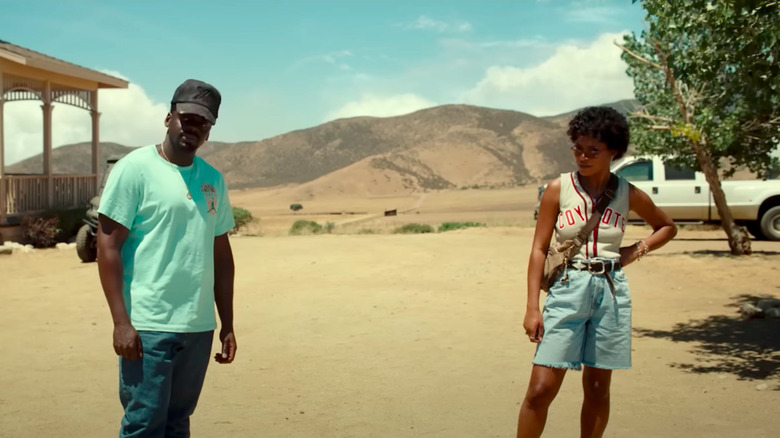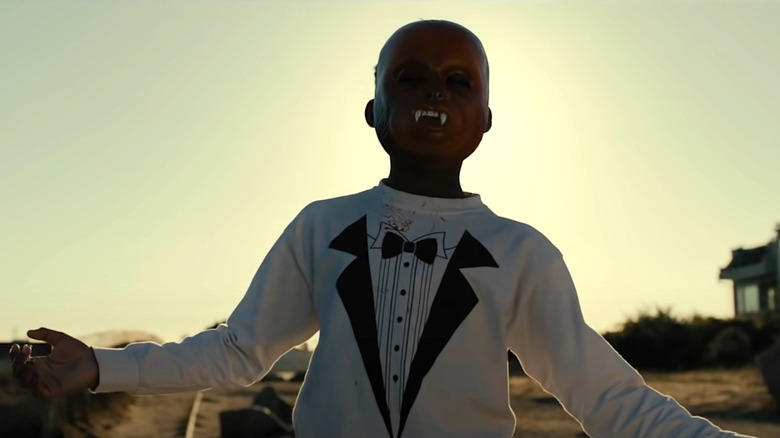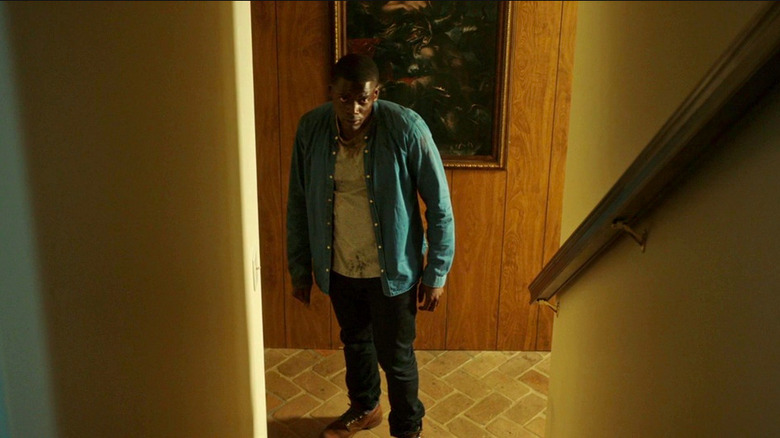Jordan Peele Wanted The Characters Of Us To Be Smarter Than Your Average Horror Cast
Despite his roots in comedy, Jordan Peele has become synonymous with horror over the last few years. His 2017 Oscar-winning film "Get Out" — which won Best Original Screenplay — received wide recognition for its smart, socially aware film about a young Black man, Chris (Daniel Kaluuya), who goes to spend the weekend at his white girlfriend Rose's (Allison Williams) family estate. The film is a searing example of how the horror genre can be utilized to effectively convey important ideas about social justice issues — "Get Out" is a stark examination of racism and being Black in America — and is an extremely important film not just for horror but for movies in general. It also helped to catapult Peele to the top of the horror director food chain, establishing him as one of the most important directors working today.
Peele most recently directed the sci-fi/horror film "Nope" (Inflatable tube people fans will dig it for sure) about a brother and sister trying to uncover the mystery behind UFOs, but before that, he directed another socially aware movie with a high-horsepower horror engine, "Us" that examines doppelgängers and otherness. All three films have their merits, but perhaps what tethers (ha ha see what I did there?) them all together is that the characters in these movies rarely fall prey to the "dumb horror character" trope that is so common in the genre. And as is often the case with Peele, the choice to make his characters smart is by design.
Dear god, don't go in there!
The characters of Jordan Peele's films know when they're being tricked. Take Jason (Evan Alex) in "Us," for example. The son of Adelaide (Lupita Nyong'o) and Gabe (Winston Duke) Wilson, Jason understands that his doppelgänger Pluto often mimics his movements. He uses this knowledge to walk his unsuspecting double back into the flames of the burning car behind him. It's a moment of smarts that saves his family from getting blown up by Pluto, and it's the perfect example of Peele's commitment to smart characters.
Horror films are notorious for their dumb characters. People constantly search for the source of the sound instead of hightailing their asses out of there. They disturb the dead and stop for help at shady gas stations despite their better judgment. For Peele, though, he tries to avoid his characters making stupid choices, though he acknowledges that sometimes in order to make a horror movie, they must. He tells BFI, "It's hard to write [smart characters] because the right response is to run away from the horror, which is basically to run out of the movie."
To help himself create smart characters while still entertaining his audience, he has a few rules. "Characters have to do what they would do in real life," he says. "If they do something out of the ordinary, I have to at least emotionally understand why that person made that choice – or somebody's gotta call it out. Somebody's gotta say, 'Excuse me, what? What are you talking about?'" This is especially important to him when writing Black characters. "Black audiences will be like, 'Mm-hmm. Mm-mm. No way would she do that," he explains.
The importance of smart, Black characters
But Peele's impetus to write smart, Black characters goes way beyond just wanting to provide a sense of believability for Black audience members. It's also about providing true agency to the Black characters on screen.
Historically, Black characters in film and especially in horror films are notoriously often the butt of the joke. They are the characters in the slasher who always die first, and more often than not they are only there to serve as a backdrop for the usually white main character to prevail. Their influence as individuals on screen is often extremely minimal, as well as infantilizing, which is why it's so critical for horror movies to flip these tropes on their collective heads.
Peele's decision to actively create smart, Black characters does a lot of work in helping to erase old, racist stereotypes from film's often problematic vocabulary, and it gives Black audiences the opportunity to see themselves and their stories centered on screen, two truly smart choices that push the boundaries of what horror can achieve in new and inclusive directions.


